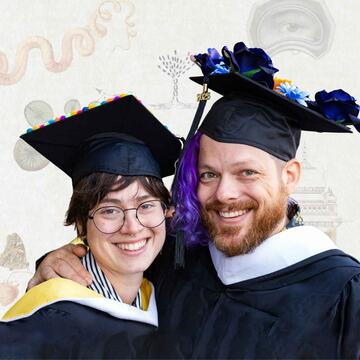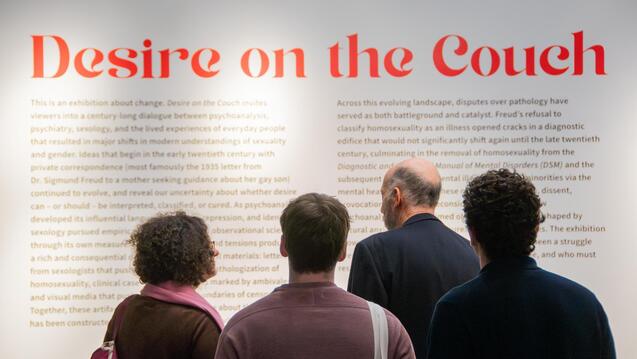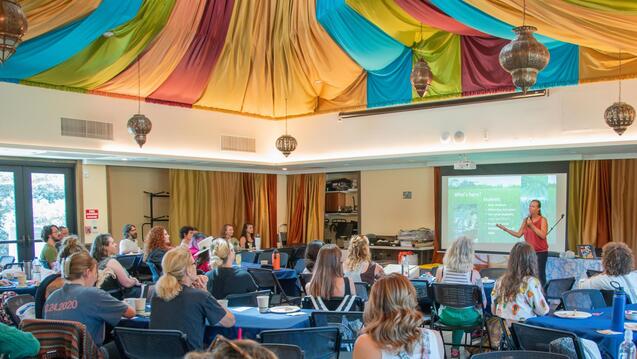Desire on the Couch is a groundbreaking exhibition at CIIS that reexamines a century of debates over sexuality, desire, and identity—bringing rarely seen archival materials and unheard stories into public view.

Lavender Languages Legacy: The No Attitude, Community-Building Conference Comes to CIIS
Scholars in queer linguistics, language, and sexuality share about their experience going to the Lavender Language conferences of the past
The Lavender Languages conference is the longest continuously running LGBTQ studies conference in the United States and the only conference that addresses LGBTQ language issues.
Bill Leap established the conference in 1993 to expand discussions on queer linguistics, language, and sexuality. He shares, “there was no event like it at that time and I wanted to meet people who were looking at language and same-sex desires, practices and identities and raising larger questions about what those linguistic practices might mean within a ‘theory of language’ and afield of (then) heterodominant inquiry. Since then, conference activities have done much to claim a legitimacy of place for these studies and their researchers within academic and political inquiry. There is still much to do, to those ends, of course.”
Originally launched in the United States with an attendance of 50 to 60 participants, Lavender Languages has expanded to international locations with over 250 attendees. In 2020, the conference was hosted at the University of Gothenburg in Sweden and in 2022 the University of Catania in Italy plans to host.
Despite its growth over time, the conference is still as accessible, inclusive, and welcoming as it was when it first began. “It operates on a minimal budget and depends on ‘the kindness of strangers’ to make things come together,” Leap explains.
“Its participants and its managers share a ‘no attitude’ conference philosophy. Prima Donna figures who want to build careers by stepping on the rest of us are not tolerated. All this works together to make the conference user friendly and unique. I believe this is one reason why people return, year after year.”
This no attitude ethos is a major legacy of the conference, explains Nikki Lane, assistant professor of Black Queer Studies in the Comparative Women's Studies Program at Spelman College, “it's my favorite conference to attend and always has been because there's no pretense. You can just be, and you can walk up to [people] whose books you've read and actually have conversations with them as colleagues and [I] felt that even as a graduate student attending the conference.”
Sharif Mowlabocus, an associate professor in Communication at Fordham University, agrees, “one the things that I first noticed when I attended my first [Lavender Languages] conference was the lack of hierarchy and the lack of deference or stardom being promoted by the conference. This was a welcome change from other, larger conferences, where students and early career professionals are timetabled at the margins of the schedule, and where senior professors are treated as if they were royalty. I credit this more inclusive approach to Bill Leap - a man who actively supports junior scholarship and, in doing so, has set a standard for [conference] delegates. I have recommended [Lavender Languages] to many Ph.D. students not only because it is an excellent place in which to receive constructive criticism on their work, but also because I want them to learn that academic conferences do not have to be snobbish affairs, where one’s seniority determines one’s value.”
A welcoming ethos makes for a great event for both early and established professionals
Lucy Jones, associate professor in Sociolinguistics and faculty and school director of Equality, Diversity, and Inclusion at the University of Nottingham, describes how their professional development was shaped by Lavender Languages.
“When I was a grad student in 2007, Lavender [Languages] was the first conference where I presented my work – and it was the first place where I felt that the research I was doing into lesbian discourse was really understood. Many of the people I met in that first year, and in the years which followed, have been hugely influential to me both in terms of my understanding of queer linguistics but also in terms of the opportunities I’ve had. It’s an inclusive environment which is really well suited to the discovery of new research and the testing of new ideas, and in my experience, it’s been a much less intimidating space for students to present their work than at many other, larger conferences. Many grad students work in departments where there are no language and sexuality specialists, so this is particularly beneficial to them in terms of expert input but also as a way of developing a network of their own. Even for those who do work with queer linguists, it’s incredibly valuable to be able to share your research even before you have data or analysis to present – and there isn’t usually a space to do that at academic conferences.”
Sharif Mowlabocus explains more on how the conference reflects its transdisciplinarity, “I am not a linguist or an anthropologist and so my attendance at and investment in, [Lavender Languages] might at first seem odd. However, my work in communication and media studies inevitably touches upon issues of language. Being able to present my work in a setting where I know that my approach to language, coming from another discipline, will be welcomed is very important.”
The legacy of the Lavender Languages is the community created around it
Professors bring their students year after year to build a sense of belonging and connection that makes academic production generative and inspiring. As Nikki Lane explains, “it's a place where I've been able to hone and refine my techniques and approaches with other people doing similar work. This really is different than some of the other big conferences I attend because I'm usually one of few interested in language use. I have been to the linguistic anthropology meetings, but sometimes they're dry and almost never interested in the local and I mean this broadly. As someone who studies Black queer people in the United States, I never feel out of place at [Lavender Languages].”
Similar, Bill Leap relays that the conference has “advanced interests in quare-linguistics (queer linguistics inflected against African American sexualities), has pushed for studies in historical linguistics to address language and sexuality across inflections of race, ethnicity, gender and class, and has not remained embedded within domains of privilege. The conference has been, and remains, a welcoming site for research in trans linguistics, especially because audiences here recognize the affective importance of the topic as well as its theoretical significance. The dignity of affect is often lacking in discussion of trans language at professional meetings.”
A conference for progressive, cutting-edge scholars
Sharif Mowlabocus shares this sentiment and describes how the conference benefits professionals across disciplines, “I relish going to [Lavender Languages] and learning what early career scholars are working on. This work represents the new frontier of LGBTQ+ research and it is inspiring. The conference was representing a decolonial approach to queer studies long before it became a fashionable topic and I’ve always been in awe of the geographical diversity represented in the research. As a scholar who has spent most of his career working within digital spaces and sites, I am interested to see how traditional linguistics research and methods are being applied in the era of big data and social media. [Lavender Languages] offers a space in which the most cutting-edge research (often undertaken by graduate students) can be shared in a supportive, yet critically focused environment.”
Lavender Languages is the forerunner in exploring lavender lexicons and discussing topics which may otherwise be neglected. Bill Leap explains “the absence of LGBTQ [content in other programs] erases the idea of LGBTQ presence at the meetings and thereby discourages LGBTQ attendance, and thereby validates images of erasure.”
As a result of this focus, Lavender Languages has been highly influential in the development of major publications on key issues and debates in queer linguistics, LGBTQ language, and sexuality studies. The Journal of Language and Sexuality of John Benjamins Publishing Company is just one example of how presentations and responses to presentations at Lavender Languages have prompted the growth of publications and critical assessment of its topics.
Lavender Languages is a trailblazer by presenting cutting-edge research and establishing a kind reception open to its participants. “I’ve seen more interdisciplinary work and new approaches being presented at Lavender [Languages] than anywhere else” Lucy Jones goes on to say, “and I think that’s because people don’t feel constrained by disciplinary boundaries in the same way that they might at other conferences. It’s also really significant that presenters often don’t feel the need to explain in detail, or perhaps even justify, particular non-normative identities or queer concepts when introducing the premise of their papers. It’s refreshing, and for me has always marked out the difference between attending conferences focused on sociolinguistics more broadly and attending Lavender. It’s one of the things that makes this a community – we have a shared understanding of how diverse and innovative queer linguistics can be. I feel so lucky to be a part of it!”
Mowlabocus adds, “what brings me back to the conference is the sense of community, and the opportunity to meet up with and listen to the work of, colleagues who I originally met at the conference. The size of [Lavender Languages] means this still feels like a friendly conference, while the lower cost means it is genuinely accessible to many more people than some of the larger, more expensive conferences. The result is that the community is more diverse - both in terms of where folks are coming from, but also in terms of the representation of disciplines. As a scholar who works across disciplines, this is very important. Having a smorgasbord of theoretical and disciplinary approaches means that you always walk away from this conference having learned a lot - some of which may well go on to influence your thinking in relation to your own research.”
Despite being held only one long weekend per year, Lavender Languages has the capacity to stimulate change beyond its event dates. “If we can get the broader public to think about language and sexuality, and the importance of language to sexuality, we have opened the door to making other advances in educating the public (and ourselves) about sexuality, in removing barriers to health care delivery, in effective training of health care professionals and the like,” Leap notes. “Listening to how people represent their sexuality and talking to people from the terms that they know are starting points for all of the above.”
Related Academic Programs
M.A. in Critical Sexuality Studies and Ph.D. in Human Sexuality
Related News
A $30,000 grant will establish a faculty research fund at CIIS, creating opportunities for innovative studies in Somatic Psychology and Integral Transpersonal Psychology.
Expressive arts coaching uses creativity to foster resilience, connection, and meaningful change.



